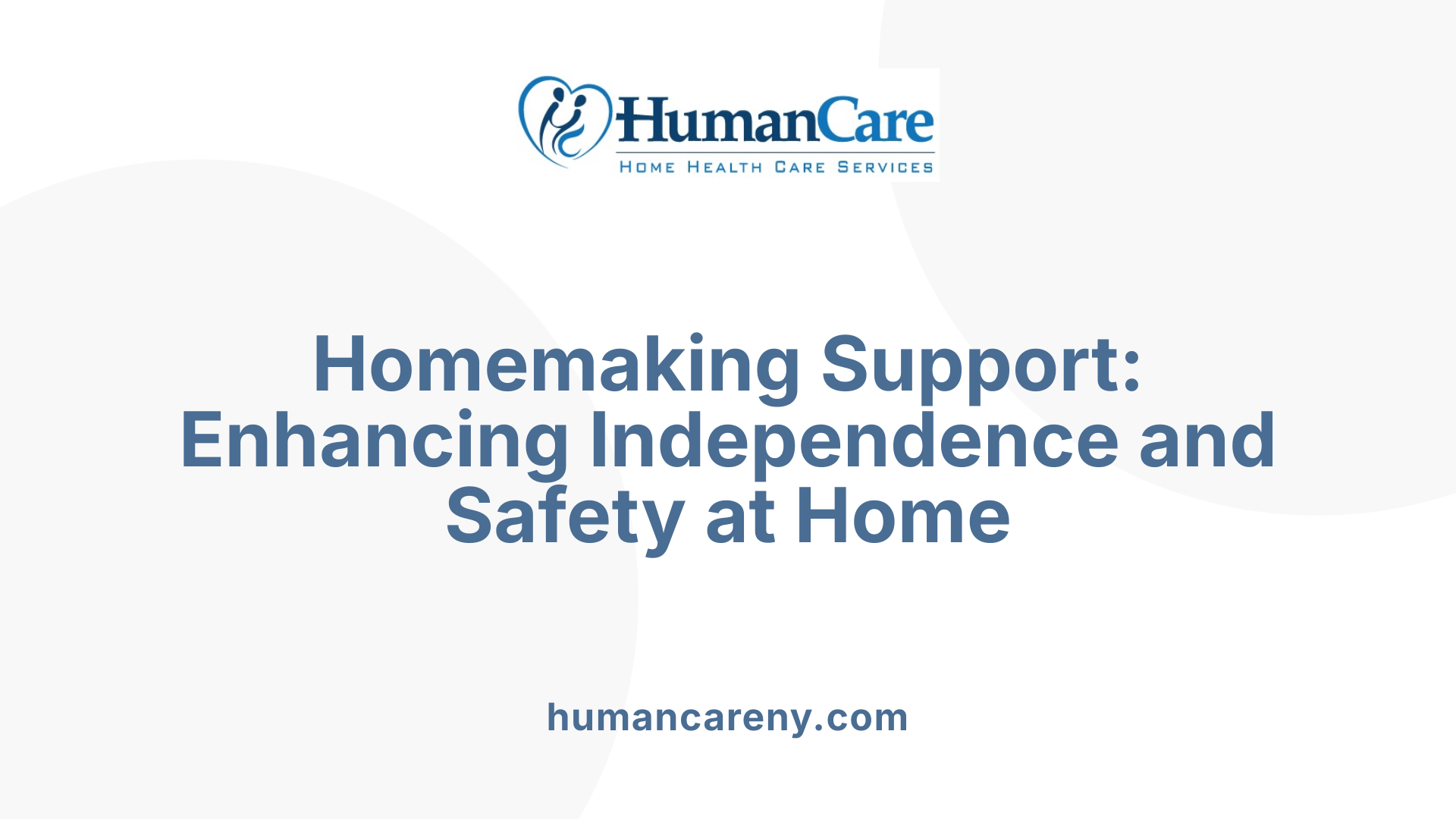Enhancing Elderly Well-Being Through Homemaking Services
As the aging population grows, ensuring the mental health and emotional stability of seniors becomes increasingly important. Homemaking support services, including companionship and assistance with daily activities, play a vital role in fostering mental wellness among older adults. This article explores how these services provide social interaction, promote independence, and create a secure environment that collectively enhance quality of life for seniors.
The Role of Consistent Social Contact in Elderly Mental Health

Why do regular visits from companions matter?
Regular visits from companions serve more than just a social purpose; they are crucial for maintaining emotional stability and mental engagement among seniors. Consistent contact reassures elders, helping to stabilize their moods and create a sense of routine that fosters security and peace of mind. Through simple activities like sharing stories or playing word games, companions stimulate cognitive functions, which can delay cognitive decline, including dementia.
How does social interaction impact elder well-being?
Social interaction reduces feelings of loneliness and social isolation, common issues faced by many seniors. These interactions encourage positive emotions, enhance optimism, and promote resilience during difficult times such as illness or loss. Engaging regularly with trusted caregivers builds emotional security, making seniors feel valued and respected. Additionally, conversations and shared activities brighten their daily lives, supporting overall mental wellness.
In what ways can social engagement reduce loneliness and isolation?
Loneliness and isolation are known risk factors for depression and anxiety in older adults. In-home companionship services combat these risks by providing consistent, meaningful human contact. This interaction helps seniors feel less alone, boosting mood and mental health. Furthermore, engaging seniors in mentally stimulating activities like puzzles or reading helps maintain cognitive clarity, preventing social withdrawal that often accompanies cognitive decline.
| Aspect of Support | Benefits | Additional Details |
|---|---|---|
| Emotional Stability | Provides reassurance and reduces anxiety | Regular visits create a predictable routine that offers comfort |
| Cognitive Engagement | Supports mental sharpness and delays decline | Activities like storytelling stimulate memory and attention |
| Social Connection | Reduces feelings of loneliness and fosters happiness | One-on-one companionship helps seniors feel heard and valued |
| Independence & Confidence | Encourages self-esteem and autonomy | Assistance with daily tasks supports continued independence |
Why do these services matter?
Overall, companionship services are vital for enhancing the quality of seniors' lives. They help maintain mental health, promote emotional resilience, and foster a sense of community within the home setting. By providing reliable human contact and engaging activities, these services help older adults live happier, more fulfilled lives, thriving within the comfort of their familiar environment.
Activities that Promote Cognitive and Emotional Balance

How does engagement in hobbies and mental stimulation benefit seniors?
Participating in hobbies and mentally engaging activities has a profound impact on seniors' overall well-being. Activities like reading, puzzles, card games, or sharing stories stimulate the brain, helping to maintain mental agility. Regular mental engagement can delay or slow down cognitive decline, supporting cognitive health and independence.
What shared activities like puzzles and storytelling help with?
Shared activities such as puzzles and storytelling foster social interaction and emotional connection. They encourage seniors to recall memories, express themselves, and enjoy moments of happiness. These engagements not only entertain but also reinforce attention and memory skills, which are vital for cognitive vitality.
How do these activities support memory and cognitive health?
Engaging in cognitive activities actively challenges the brain, which can strengthen neural pathways and improve cognitive function. Such mental exercises boost confidence and reduce anxiety about cognitive deterioration. They are crucial in supporting memory retention and focus, ultimately enhancing seniors’ quality of life.
Supporting details in table
| Activity Type | Purpose | Impact |
|---|---|---|
| Puzzles and games | Stimulate attention and problem-solving | Reduce risk of dementia, improve reasoning |
| Storytelling and conversation | Share experiences, engage memory | Strengthen memory, foster emotional bonding |
| Reading and hobbies | Promote mental stimulation, relaxation | Enhance cognitive health, reduce stress |
| Routine-based activities | Provide daily structure and familiarity | Increase emotional security and stability |
Fostering engagement in these activities provides not only cognitive benefits but also emotional support, creating a balanced mental state that enhances overall quality of life for seniors.
In-Home Support Effects on Emotional Security and Safety
What are the positive impacts of in-home support on seniors' emotional well-being, stress reduction, and safety?
In-home companionship and assistance significantly boost seniors' emotional health. Regular visits from caregivers foster social bonds and offer opportunities for meaningful interactions, helping reduce feelings of loneliness and social isolation. These connections provide reassurance and a sense of security, which are vital for emotional stability.
Supporting seniors with daily routines such as personal grooming, household chores, and medical needs also helps bolster their independence and sense of dignity. This boosts confidence and promotes a positive outlook on life.
Mental and emotional benefits include lower anxiety levels, increased feelings of gratitude, and a stronger sense of belonging. These services help seniors feel respected, understood, and cared for, enhancing overall mental health.
Safety is also improved through assistive devices, safety checks, and careful supervision. These measures prevent accidents, falls, and medical complications, especially for those with mobility or cognitive challenges.
Moreover, supporting family caregivers by sharing responsibilities reduces their stress and prevents burnout, contributing indirectly to the senior's well-being.
Overall, in-home support ensures seniors enjoy a higher quality of life within their familiar environment, nurturing both safety and emotional resilience.
How does in-home support contribute to safety and accident prevention?
Safety in the home is a priority in in-home support services. Regular help with household tasks, such as cleaning and organizing, minimizes hazards like clutter or slippery surfaces. Caregivers also perform safety checks to identify and address potential risks.
Assistive devices like grab bars, stairlifts, and special lighting are used to prevent falls. Close supervision during activities like bathing or moving around the house ensures that seniors do not hurt themselves.
Medical management, including medication reminders and health monitoring, reduces the chance of health emergencies. For seniors with cognitive impairments, constant supervision helps prevent wandering or disorientation.
These safety protocols create a secure environment, giving seniors confidence to stay active and independent. They also provide peace of mind for families, knowing their loved ones are protected.
Altogether, the combination of personalized care, safety tools, and vigilant oversight in in-home services plays a crucial role in accident prevention, supporting safer, healthier aging at home.
Impact of Homemaking on Overall Quality of Life

How does homemaking support improve overall quality of life and emotional wellness in the elderly?
Homemaking support plays a vital role in enhancing the overall quality of life and emotional wellness of seniors. By assisting with everyday household tasks such as cleaning, meal preparation, and errands, homemaking services help elderly individuals maintain their independence and manage their daily routines effectively.
This support reduces feelings of stress and burden, creating a sense of security and comfort within their home environment. When seniors receive personalized care, including companionship and emotional support, they often experience increased confidence, happiness, and a stronger sense of connection.
A well-maintained home equipped with necessary safety features lessens the risk of falls and accidents, which further promotes physical health. When combined with community resources and tailored care plans, homemaking services help combat loneliness and foster emotional reassurance. This holistic approach encourages seniors to age comfortably and happily in their own homes, maintaining dignity and self-respect.
| Aspect | Benefit | Additional Details |
|---|---|---|
| Independence | Preserves autonomy | Support with daily chores and personal care |
| Safety | Prevents accidents | Organized, hazard-free environment |
| Emotional Wellness | Reduces loneliness | Companionship and personalized interactions |
| Overall Well-being | Enhances happiness | Respectful, compassionate care |
Overall, homemaking services actively contribute to a more fulfilling, secure, and joyful life for seniors, supporting both their mental and physical health.
Fostering Mental Wellness Through Care at Home
Supporting seniors with comprehensive homemaking and companionship services leads to profound benefits in mental health, emotional resilience, and overall quality of life. By creating a secure, engaging, and respectful environment within their homes, these services empower elders to live with dignity, independence, and happiness. As the demand for elder care grows, emphasizing the importance of personalized, compassionate in-home support remains essential for fostering healthier, more vibrant aging experiences.
References
- HOW IN-HOME COMPANIONSHIP IMPROVES MENTAL ...
- How In-Home Care Promotes Mental Wellness in Seniors
- The Benefits of Utilizing Homemaker Services
- How Homemaking Services Can Enhance Daily Life for ...
- How Home Care Improves Elderly Well-Being and Mental ...
- How Companionship Boosts Emotional Wellness for Seniors
- How Home Health Care Promotes Independence and Well ...
- HOW IN-HOME COMPANIONSHIP IMPROVES MENTAL ...
- Senior Mental Health Activities for Increased Well-Being
- Supporting Seniors with Daily Homemaking Tasks



